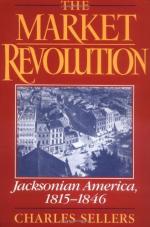
|
| Name: _________________________ | Period: ___________________ |
This test consists of 15 multiple choice questions and 5 short answer questions.
Multiple Choice Questions
1. What did the Supreme Court say with regard to Jackson's policy about the Indians in Georgia?
(a) They said the Indians had to be removed.
(b) They gave Georgia freedom to deal with the Indians.
(c) They said federal law prevailed.
(d) They said the Indians were U.S. citizens.
2. Who was Biddle?
(a) Republican Whip.
(b) Chairman of the Federal Bank.
(c) Secretary of Defense.
(d) Speaker of the House.
3. What kind of eschatology did Jonathan Edwards and Samuel Hopkins preach?
(a) The millennium-long rule of Christ would begin gradually.
(b) The world would be destroyed for mankind's sins.
(c) A new utopia was near at hand.
(d) Judgment day was imminent.
4. How does Sellers define Waldo Emerson's transcendentalism?
(a) Unitarian sentimentalism.
(b) Uniquely American spirituality.
(c) Anarchic American atheism.
(d) Antinomian rebelliousness.
5. What happened that workers began to unionize in the north?
(a) Wages did not rise as fast as capitalists' fortunes.
(b) Tariffs lowered the costs of production, driving wages down.
(c) Immigrants threatened to provide cheaper labor.
(d) Working conditions declined.
6. Who delivered this result for the northern manufacturers?
(a) Robert Owen.
(b) John Calhoun.
(c) Henry Clay.
(d) Andrew Jackson.
7. How did Biddle ultimately make sure the Federal Bank would die, in Sellers's account?
(a) He neglected to consider the cost of the federal debt in debt maintenance.
(b) He played his policies just right.
(c) He overplayed his hand.
(d) He mismanaged the monetary supply.
8. Who does Sellers say found New Light theology too radical?
(a) Antinomians.
(b) Southern New England Congregationalists.
(c) Unitarians.
(d) Southern Baptists.
9. How did Andrew Jackson change his stance with regard to the Indian removal issue in Georgia?
(a) He backed states' rights.
(b) He insisted on the federal government's primacy.
(c) He allowed the military to act on its own.
(d) He insisted on federal coordination of policies.
10. What did new organizations try to do as they arose during the 1830s, in Sellers's account?
(a) Expand into new territories before the federal government established rule of law there.
(b) Profit from the gap between democracy and capitalism.
(c) Resolve the contradiction between democracy and capitalism.
(d) Distinguish between nationalists and merchants.
11. What was Jackson's belief about markets?
(a) They needed a strong central bank.
(b) They would regulate themselves.
(c) They tended to increase class inequality.
(d) They needed heavy regulation by the government.
12. What does Sellers say is the appropriate outlet for the sexual forces liberated in masturbation?
(a) Education.
(b) The market.
(c) Politics.
(d) Productivity.
13. Where did democratic sentiment exist in the south, in Sellers's account?
(a) In the few urban centers.
(b) In the slaves.
(c) In the slave holders.
(d) In the masses who did not work on plantations.
14. What theory of Sellers's is expounded in Chapter 8, Ethos vs. Eros?
(a) That capitalism leads to social repression.
(b) That capitalism thrives in repressive cultures.
(c) That capitalism is driven by repressed sexual energy.
(d) That capitalism liberates sexual energy.
15. What was NOT a contributing factor to the expansion of literacy in the U.S. in the 1830s?
(a) Industrial jobs required reading and writing.
(b) Novels and newspapers were widely distributed.
(c) Immigration increased.
(d) Media becomes even cheaper to produce.
Short Answer Questions
1. What did crusaders NOT campaign for after the economic stress of 1819?
2. What did the Moderate Light churches begin to focus on, according to Sellers?
3. What is the only way to cope the with economic stress of the market, according to Sellers?
4. What was the benefit for which the country was suffering inflation, monetary instability, debt, and the boom-bust cycle?
5. What was the result of the railroad system, in Sellers's account?
|
This section contains 642 words (approx. 3 pages at 300 words per page) |

|




